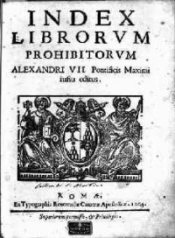|
Illuminations and Epiphanies
Banned Books
A Chronological Collection of
Banned Books
The Ancient World
|
Works of Anaxagoras. We often
think--or at least are often taught--that the Athenian age was a time
of intellectual openness and respect for new ideas. Well, not
quite. In ancient Greece, around the 5th century, B.C., the works
of the philosopher, Anaxagoras, were destroyed and he was exiled from
Athens for subverting established religious beliefs by recording his
hypotheses regarding the nature of celestial bodies.
|
|
|
Works of Protagoras.
Another philosopher, Protagoras, also found his books burned and
himself chased from Athens for his impious assertions that 1) man is
the measure of all things, 2) weak arguments often contain truths and
are better than seemingly stronger arguments, and 3) it is impossible
to tell if gods exist. Apparently, it was his declaration in a
now lost work, On the Gods,
that "Concerning the gods, I have no means
of knowing whether they exist or not or what sort they may be, because
of the obscurity of the subject, and the brevity of human life," that
most upset the Athenian hierarchy.
Very
few scraps of Protagoras's works remain, and most of what we know about
them comes from the writings of Plato.
|
|
|
Analects, the Sayings of Confucius and
his Disciples. While Emperor Shi Huang began to
consolidate
power as he established his Qin dynasty, he came to the belief that the
doubts and questions raised by the works of Confucius were hindering
his attempt to bring order out of chaos. To remedy this problem,
he executed all of the 460 Confucian scholars that he could find by
burying them alive, and his prime minister, Li Si, burned every
Confucian work that could be located.
|
|
|
Ars Amatoria. In 8 A.D. the
Roman Emperor, Augustus, banished the poet, Ovid, exiling him to the
Black Sea colony of Tomis in what is now Romania. Although
Augustus, never provided an explanation for his action, Ovid recorded
that his expulsion was the result of carmen
et error, a poem and a mistake. Ovid's mistake may well
have
been an indiscrete romantic liaison with a member of the imperial
household. The poem was Ars
Amatoria, a poetic how-to manual on the art of seduction, which
was at odds with the emperor's attempt to reverse the decline of Rome
by establishing a number of moral reforms--including the
criminalization of adultery--that were intended to strengthen Roman
families. (Ovid's work was also burned by Savonarola in Florence
in 1497 and banned by U.S. Customs in 1928.) |
|
|
The Odyssey.
In 35 A.D. the Roman Emperor, Caligula, basing his decision on Plato's
attack on the works of Homer, determined that the epic
poem expressed Greek ideas of city-state independence and democracy which were unhealthy to
his autocratic rule. His effort to ban the work and suppress its
reading, however, were unsuccessful. |
|
|
To 100 -1500 A.D.
|
|
